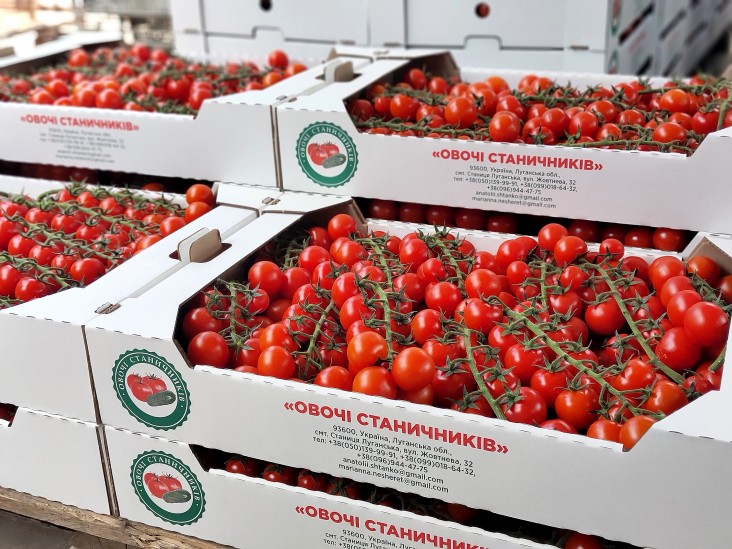Speeches Shim
With the right partner support, a vegetable collective thrives.
Development work in Ukraine’s eastern provinces requires maneuvering through a conflict area, traveling long distances to and from Kyiv, the country’s capital city, and, now, surviving a pandemic.

Undaunted, the USAID team managing the Mission’s Economic Resilience Activity (ERA) is racking up success stories as it works to bring a measure of commercial normalcy to the region through programs in a variety of sectors. A notable one involves its aid to a vegetable cooperative in Stanytsia Luhanska, a community of 14,000 and a crossing point into areas in Luhansk Oblast that are not controlled by the government.
Previously, growers sold their produce in the urban centers of Luhansk, across the Siverskyi Donets River. However, with the start of the conflict in 2014, the markets in Luhansk and in the neighboring region of Donetsk dried up.
“There is still some trade between the two sides of the front line, but at any moment it can be shut down,” said Brian Milakovsky, the resilience strategy lead for ERA. “Also, it’s very hard to understand the ‘rules of the game’ in this market; there is a high risk of corruption. The cooperative recognized early that its goal was to diversify beyond this high-risk market.”
The Stanytsia Luhanska-based cooperative looked west, and its star product—high-quality cherry tomatoes—led to a deal with Ukraine’s largest supermarket and food retail chain, Fozzy.
“We engaged the cooperative in 2018 about growing a crop that would give them an easy entry point into national value chains,” said Milakovsky. “We felt this should be with a really hot product. They chose varieties of cherry tomatoes that are in high demand and have export potential.
"We called the first group of growers we engaged ‘pathfinders,’ and they are the most advanced farmers in the cooperative. The goal was 18 tons of tomatoes, but they grew quite a bit more than that,” he said.
The ERA team provided intensive assistance, helping cooperative members get the right legal status and learn how supermarket contracts work. Of particular importance was arranging for transportation of the produce to Kyiv; from there, the tomatoes were distributed throughout the country.
“This led to rave reviews from Fozzy as well as from the end customers in the hotel, restaurant, and café wholesale sector, which became well acquainted with the cooperative’s quality of produce,” Milakovsky said. The growers are now adding crops such as mushrooms and beefsteak tomatoes.
USAID’s goal is to ensure that the collective is both sustainable and scalable long after the ERA program ends. Now, its members have a road map to reach this milestone.
“With the ERA team’s support, the area growers now believe we have a future,” said Marianna Neshcheret, president of the Ovochi Stanychnykiv Vegetable Cooperative. “This region has received humanitarian aid, but this is the type of support that can help us build for the years to come.” [Read Marianna’s story.]
Milakovsky noted that “at the beginning of this season [2020], there were 20 growers involved, as opposed to seven at the start of the program two years ago. By the end of the season, as many as 50 families will join the project, with other crops added to the mix.
“We’re increasing the amount of assistance this year because many more families are involved, but what they make this year from sales will have to cover such aspects as transportation of products next season,” he said.
The ERA team is convinced that the cooperative now has the confidence to work in a national market.
“They simply didn’t have the connections they needed in the beginning,” said Milakovsky. “So it’s a work in progress—but I think they are on track to become recognized as a national producer of high-quality produce.”

Comment
Make a general inquiry or suggest an improvement.